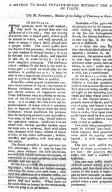[ A Method to Make Potatoe-Bread without the Admixture of Flour ] M. Parmentier
Date: 1791/04/04
Source:
Nova Scotia Magazine
Institution: Nova Scotia Archives
| Source Origin: Nova Scotia Newspapers on Microfilm
| Reference: Microfilm Reels 8062, 8063
Instructions from a member of the Paris College of Pharmacy detailing the method of extracting potato starch for use in baking bread. nn.207. Microfilm Reel 8063.
A METHOD TO MAKE POTATOE-BREAD WITHOUT THE ADMIXTURE
OF FLOUR.
[By M. Parmentier, Member of the College of Pharmacy at Paris.]
Of the STARCH.
THE potatoes must be well washed;
they must be ground fine with the
assistance of a tin rasp; they are thereby
converted into a liquid paste, which must
be diluted in water, and well agitated, in
order to empty it into a sieve placed over
a proper vessel. The water passes with
the starch of the potatoes; this starch must
be well washed in several waters; it is to
be divided into small pieces, and exposed
to the air, in order to dry it : it is of a
most exquisite whiteness. The substance
which remains in the sieve is the most fi-
brous part; it must be dried after all the
moisture is pressed out of it; it may be
used in the composition of brown bread, or
may be given in that state to poultry.
Remarks.--One pound of potatoes con-
tains three ounces of starch, two ounces of
fibrous substance and extractive matter,
and eleven ounces of vegetative water.
These substances vary according to the na-
ture of the soil and the species of the po-
tatoe. It is to clear this root from the su-
perabundance of water which it contains,
and to separate the starch from the other
substances which constitute the potatoe,
that the foregoing process is put in practice.
You may, in lieu of a rasp, which renders
the operation tedious, substitute a broad
wheel with double parallel spokes, upon
the same axis or axletree, shod with plate
iron, stamped with holes, instead of hands
of iron, or any other instrument ; besides,
necessity and practice will soon clear up
that point.
The starch extracted from potatoes has
his advantage ; that it may be kept for
many years without the least alteration,
and will still subsist without corruption, or
untouched in a frozen potatoe, even when
animals will not eat it.
Of the PULP. - Put the potatoes in boil-
ing water ; when they are boiled enough,
cast away the water, and peel them ; and,
with the assistance of a wooden roller, re-
duce them into a paste, which, by grinding
grows stiff and elastic. When there are
no more clots or lumps in the whole mass,
then the pulp is in perfection.
___
Remarks, - The parts which constitute
the potatoe are in its natural state divided;
after boiling, these parts are so united as
to be but one homogenous mass. The
starch, the fibrous substance which floated,
as one may say, in the vegetative water,
are in it dissolved.
It is from this very simple operation
that the whole fabrication of potatoe bread
depends ; without it, no panification :
moreover, the potatoe must necessarily be
in that state when we intend to mix it
with any other grain, such as buck wheat,
barley, or oats : under any other form, its
union with these sorts of grain will make,
at best, but a coarse bread.
Of the BREAD. - Take five pounds of
dried starch, and five pounds of the pulp ;
dissolve a suitable quantity of leaven on
yeast in warm water the eve or night before.
The mixture being exactly made, let it lie
all night in the kneading-trough, well co-
vered and kept warm until the next day ;
this is the second leaven ; then add five
pounds more of starch, and the same quan-
tity of pulp, and knead it well. The wa-
ter must be in proportion as a fifth part,
that is to say, that upon twenty pounds of
paste there must be five pounds of the wa-
ter. You must observe that the water be
used as hot as possible.
The paste being completely kneaded, it
must be divided into small loaves : this
bread requires slow preparation, and the
oven must be equally and moderately
heated : it will require two hours ba-
king.
The salt with which they season the
bread in some provinces is also necessary
for this : the quantity depends on the
taste ; but half a drachm seems to be
sufficient.
Any one may easily conceive that this
abstract cannot wholly give an idea of the
process, and that those who have the fabri-
cation of this bread at heart must be obli-
ged to have recourse to their own experi-
ence, because no exact account is to be ex-
pected when a new preparation is to be
performed.
Download: Transcription | Images
